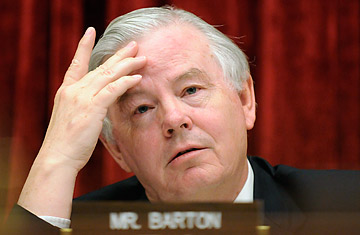
US Representative Joe Barton
(2 of 2)
5. Know your base: Barton challenged John Boehner for minority leader in 2006 after Republicans lost the House, but withdrew a humiliating six days later when it became apparent that not only did Boehner have the votes sewn up, but that few of Barton colleagues liked him enough to pledge their support.
6. In discussing (what else?) energy legislation, Barton said in a press conference that Rep. Henry Waxman didn't "have the nuts" to pass his energy bill in May 2009. He then followed with the admission — to much guffawing — "nor do I." He explains, twice, how his metaphor is taken from Texas Hold 'Em, where having "the nuts" means having the best hand. But everyone in the room, laughing like sixth-graders, clearly only heard nuts, nuts, nuts. Barton, in summation, ends with: "We'll see which one of us has the other by the nuts next week." Ultimately, Waxman did have the nuts: the House passed his climate bill on June 28, 2009.
7. When talking about climate change on C-Span in March 2007, Barton attempts to discount climate-change studies by explaining that temperature is determined by cloud shape. But his discussion of the various shapes — "tall clouds or skinny clouds, short clouds, fat clouds, high clouds, low clouds" — comes off as more Sesame Street than science.
8. As a freshman representative in the mid-1980s, Barton took a hard Texan line against spies. In the wake of Navy officer John A. Walker, Jr. being accused of leading a spy network, he said all spies should be given the death penalty as "retribution" to fellow citizens. "Where I come from what we'd do about it would be take 'em out and string 'em up," he told reporters, to some laughter. "We wouldn't go through the legalities that we have to because of our due process." Oddly this seems to be the opposite tact he took with BP on Thursday where, in lamenting the Administration's "shakedown" of of BP, Barton said: "We have a due process system, where we go through hearings, in some cases court cases, litigation, and determine what those damages are and when those damages should be paid."
